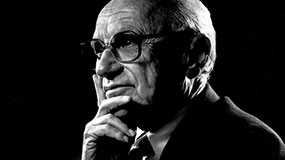
 When it gets out that I am a libertarian, I am greeted with either scorn or intrigue. This piece will explain my journey, which led me to believe you should be free to pursue your own version of happiness, provided that pursuit does not curtail the freedoms or health of your fellow travelers.
When it gets out that I am a libertarian, I am greeted with either scorn or intrigue. This piece will explain my journey, which led me to believe you should be free to pursue your own version of happiness, provided that pursuit does not curtail the freedoms or health of your fellow travelers.
I held a rigid view of the world. Describing myself as “far-left,” I generally believed the market, left unbridled, would undermine the foundation of civilization – I did not know what that foundation was. When challenged, I regurgitated Michael Moore, Naomi Klein and Noam Chomsky. Being deeply curious, I sought to discover more and assail those who eviscerated my positions in argument. “If you want to know how the world works; follow the money.” My major became Economics.
I recall the exact moment of sea change: Microeconomics, and the topic was price controls. We were analyzing the impact of a minimum wage on the neo-classical supply and demand schedule. “Increasing the wage rate through legislation provides incentive for labourers to enter the labour force and seek employment. As firms will only hire so many workers at a marginal revenue product of labour, a surplus results,” said the Professor. With no bias or rancor detectable in his voice, with all intuition and economic law satisfied, I discovered the minimum wage created unemployment. Preconceived theories of economics fell like dominoes. Dopamine hit my prefrontal cortex like a sledgehammer.
At the time, I was chewing a book entitled The Red Queen by Matt Ridley. In it, the Oxford educated Zoologist- turned-rogue-Economist explained human behavior through sexual selection. An engaged read, I witnessed the near perfect juxtaposition of Economics in Biology. To my amazement I discovered later that Charles Darwin had relied heavily not on the contemporary thought of natural history which had fleeting nods to the divine, but the work of two Economists: The Wealth of Nations by Adam Smith and The Principles of Population by Thomas Malthus. Darwin’s Natural Selection was Smith’s Invisible Hand. Markets were a process, not a schedule of values.
For months, action potentials lit up my synapses. Arriving at a hypothesis, I began to view the market as an ecosystem. A complex highly adaptive yet monetized “entangled bank” subject to violent and sudden change if its parameters were tampered with – much the same as mans’ continued tampering in the biosphere. Free of government intrusion, firms unable to adapt and produce goods and services demanded by consumers would perish. Those able to meet the challenge would profit and succeed – capricious tyranny of the consumer. Fitting and profoundly spiritual the revelation this “man made” market should resemble with such pulchritudinous symmetry the very process that had given rise to our species. To borrow from the Economist Joseph Schumpeter, it was “Creative Destruction.” Convinced of my suspicions, I hesitantly proposed the idea to one of my Professors. Responding with a satisfied smile: “Yeah, that’s exactly what it is.”
Positive was positive. What about normative? Even if economic law was satisfied with the complement of a robust biologic analogue, was liberty moral?
If regulation of markets leads to “unintended consequences,” what social regulation would I consider legitimate or abhorrent? For a year, Mill, Locke, Bastiat, Hayek and Smith became my sparring partners. What I came up with was the opposite of what I set out to gain: certainty. I do not know what is best for you. No matter how sure I am that some legislation is desirable, I ask myself: “Would I be willing to lock up people who oppose it?” Every conception of utopia was birthed from minds sharing 98 percent of their genome with chimpanzees – humility before hubris. If we got something as obvious as slavery wrong, what other deleterious policies are we enacting? Black and white became grey.
All I can determine is that I wish to be free of violence, theft and coercion, to be left alone and pursue my own unique version of happiness. If we share desired ends, best to chase them voluntarily. I finish with a quote from man I attribute to my revolution:
“As I see it the fundamental value in relations amongst people is to respect the dignity and the individuality of your fellow man. Treat your fellow man not as an object to be manipulated for your purpose, but treat him as a person with his own values and his own rights. A person to be persuaded – not coerced, not forced, not bulldozed, not brainwashed. That seems to me to be a fundamental value in social relations. Whenever we depart from voluntary cooperation and try to good by using force; the bad moral value of force triumphs over good intentions.”
– Milton Friedman
Is liberty moral? I believe so.

